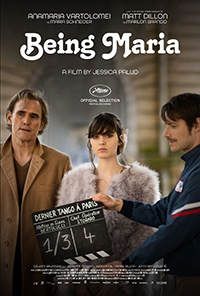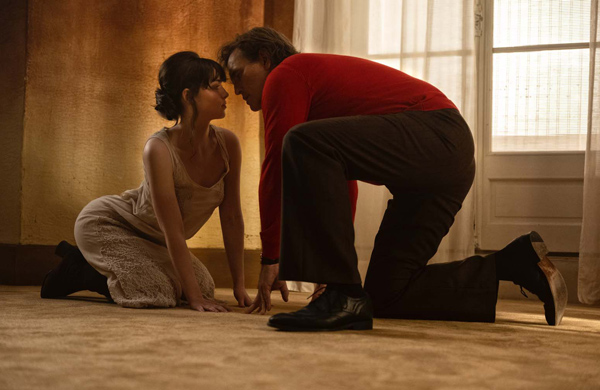Forever Noor: Palud’s Schneider Moves From Being a Passenger to Just Saying Non
 Since the advent of cinema, it’s been standard operating procedure for the film industry to chew up and then discard actress when they become difficult, old or inconvenient. It’s a man’s world—made by men, written by men, and controlled by men. Despite passing away in her late fifties after a life of abuse and deep psychological wounds and undoubtedly not getting her day in public court, Jessica Palud’s biopic manages to achieve the impossible: reclaim her power for her. Following her portrayal of a shattered soul in L’Événement, Anamaria Vartolomei is perfectly cast here — embodying a fallen angel who may not rise from the ashes in the conventional manner, but who gains power through saying “non,” controlling conversations, and working on films that do not objectify her — Antonioni’s The Passenger (aka Professione: reporter) was always a role she proudly reverted back to in convos with film journalists. A rather stripped down biopic, we witness the promise and the pain and that both didn’t define her—it merely showcased that the coping mechanisms and resilience that she possessed. Maria would have been proud of Being Maria.
Since the advent of cinema, it’s been standard operating procedure for the film industry to chew up and then discard actress when they become difficult, old or inconvenient. It’s a man’s world—made by men, written by men, and controlled by men. Despite passing away in her late fifties after a life of abuse and deep psychological wounds and undoubtedly not getting her day in public court, Jessica Palud’s biopic manages to achieve the impossible: reclaim her power for her. Following her portrayal of a shattered soul in L’Événement, Anamaria Vartolomei is perfectly cast here — embodying a fallen angel who may not rise from the ashes in the conventional manner, but who gains power through saying “non,” controlling conversations, and working on films that do not objectify her — Antonioni’s The Passenger (aka Professione: reporter) was always a role she proudly reverted back to in convos with film journalists. A rather stripped down biopic, we witness the promise and the pain and that both didn’t define her—it merely showcased that the coping mechanisms and resilience that she possessed. Maria would have been proud of Being Maria.
Plucking from Vanessa Schneider’s Tu T’Appelais Maria Schneider, and co-written alongside Laurette Polmanss (often collab with Catherine Corsini) Palud works with several themes: daddy issues, rejection, addiction, and validation. We begin with a rocky adolescence, thwarted normalcy for a chance re-encounter with her father — popular French actor Daniel Gélin (Yan Attal). The predatory nature of the industry becomes apparent, as Maria, with no experience, is cast by Bernardo Bertolucci (Giuseppe Maggio) to star opposite Marlon Brando (convincingly portrayed by Matt Dillon) in Last Tango in Paris. Bertolucci’s technique is that of improvisation — and wanting to get to the true essence of his characters. As Maria spends considerable time in the empty apartment turned film set, Palud then starts the downward descent of meeting the wrong people, pushing away her family, subsequent film projects she was not proud of, and the arrival of Noor (played by Céleste Brunnquell) — who does end up becoming her rock amidst life’s turbulence.

Perhaps Palud’s big gamble that pays off is the considerable amount of time we spend on her Last Tango in Paris. In what initially feels like a safe space of creativity replaced by two conspiring adult men who take away her power, by a stick of butter for the sake of the art. In the painful sequences that jolt the film, the camera almost feels like two seater convertible vehicle. Cinematographer Sébastien Buchmann (The Passengers of the Night) adheres to a frontal, stationary camera that allows Palud’s use of the frame to subvert both the male gaze and female gaze. It’s a deeply disturbing pre-and post take aftermath that is the heart and centre of the film — it a nutshell it shows why people are drawn to the profession, strips away the veneer, the mythology and magic associated to cinema.
Schneider would be harassed and charged criminally in Italy after the film’s release — film history didn’t want to accept that two men raped the actress. Palud would end up working on the set of The Dreamers (2003) early in her career – so there is an entire other conversation her for wanting to tackle resonates with her in her own career path. Palud’s feature 2019 debut Revenir worked with themes of forgiveness, and redemption — and Being Maria isn’t too far off. A timely portrait doesn’t play the martyr or victim card — this oeuvre feels like a colonoscopy of not the infamous sequence, but of all the numerous infractions that the starlet had to endure and survive with the major take-away being that Maria, who was feted, rejected and much much later on, empowered was leaving clues for the next generations of film actresses to come.
Reviewed on May 21st at the 2024 Cannes Film Festival – Cannes Premiere section. 102 Mins.
★★★½/☆☆☆☆☆


